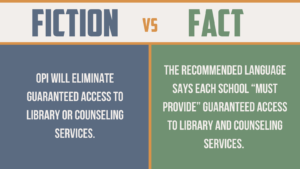Setting The Record Straight
"After you separate the fact from the fiction it is clear that OPI’s recommended rule changes aren’t the end of education, but the beginning of putting control of a child's education back in the hands of parents."
“Education is the key to unlocking the golden door of freedom.” – George Washington Carver, Scientist and Inventor
Last week Montana’s Office of Public Instruction released its initial plan to recommend rule changes that would provide Montana schools more local control and greater flexibility. These recommended rule changes would eliminate staff-to-student ratio rules for school librarians and school counselors.
For those unfamiliar with ratio rules let me explain what they are. Ratio rules are government imposed rules that require a school to hire a certain number of librarians and counselors in proportion to the number of students at a school, without regard for actual need at any particular school.
Just as you might suspect, unions were quick to call the recommended changes nothing short of catastrophe, so in an effort to sort fact from fiction we sat down and wrote an article to set the record straight on some of the most widely circulated claims.
Here is just a one of the claims we set straight:

Nowhere in the recommended language does it say these services are optional for schools to provide. Claims that OPI’s rule changes will eliminate guaranteed access to library or counseling services are false, period.
After you separate the fact from the fiction it is clear that OPI’s recommended rule changes aren’t the end of education, but the beginning of putting control of a child’s education back in the hands of parents and local communities responsible for raising them.
To find out what this means for your ability to direct your child’s education click HERE.
For Liberty,
Tanner Avery
The Latest
Big Government is not the answer to Big Tech
You’re probably intimately familiar with how Big Tech can easily censor viewpoints they disagree with, which has pushed some politicians to call for government intervention. Frontier CEO & President Kendall Cotton explains why that is a bad idea in his most recent op-ed in Lee Newspapers.
“We should be wary of calls by politicians to fight problems like censorship by growing government. If the problem with Big Tech is centralized control of online activity, then Big Government — the most centralized authority of all — can never be the solution. The answer lies instead in decentralizing control of online activity to make it more free and secure.”
He goes on to lay out three ways policymakers can clear a path for decentralized tech.
- Resist tech centralization.
“Lawmakers should resist the temptation to increase government control over the tech industry. Replacing Big Tech with Big Government will only serve to entrench the status quo.”
- Embrace tech decentralization with the law.
“Entrepreneurs face vast legal uncertainty about building decentralized organizations. Old school regulatory frameworks must be updated to accommodate the decentralized organizations of the future. Montana policymakers should consider following the lead of Wyoming and Tennessee, creating a framework to legally recognize decentralized organizations.”
- Create a Regulatory Sandbox.
“Lawmakers could implement a Regulatory Sandbox to fast-track decentralized tech to the market by temporarily waiving red tape standing in the way. A Regulatory Sandbox would provide flexibility to accommodate decentralized tech entrepreneurs while also giving policymakers time to safely test and learn the effects of waiving certain regulations.”
To see the entire column click HERE.
